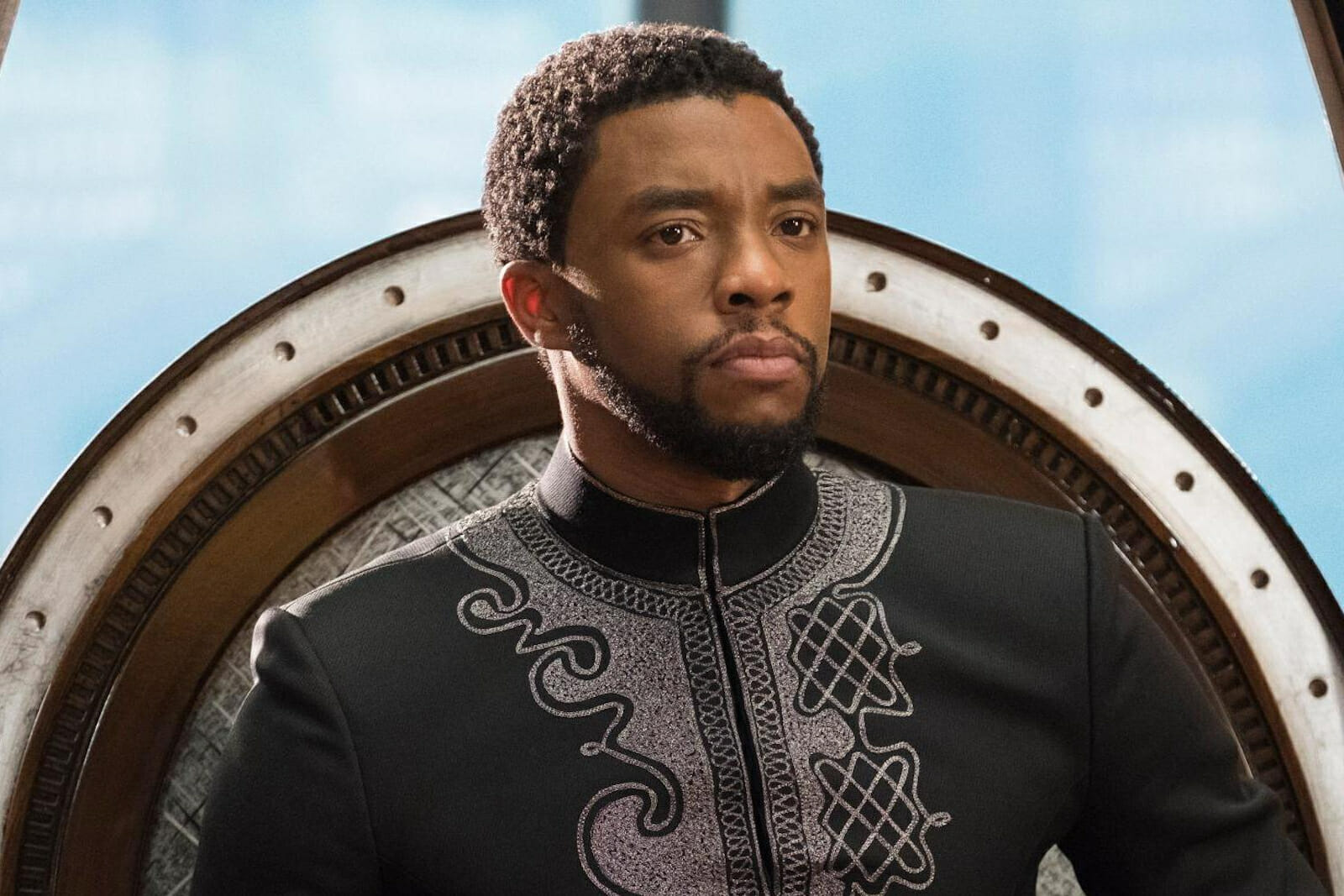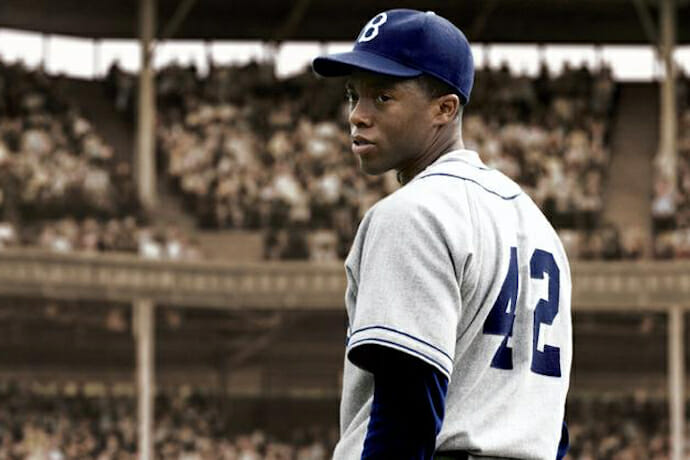
A Tribute to Chadwick Boseman
When it was announced that actor Chadwick Boseman, perhaps best known as the titular superhero character in the Marvel mega-blockbuster Black Panther, had passed away on August 28 at the age of 43 from complications from a colon cancer diagnosis he had kept very private, my heart sank. I was saddened, shocked, and stunned. Already in the midst of a year that felt like the very definition of unprecedented, here was a celebrity passing that deeply affected many, myself included. Boseman had already distinguished himself as an actor who took risks, and his future held even more potential and promise. Now, in a world already deeply in mourning amidst a global pandemic, here was yet another example of grieving what could have been.
Film critic Bob Chipman has noted that what made Boseman’s passing harder to deal with than others was the simple question of “how do we tell the kids?” Indeed, for so many who took inspiration from Boseman as Black Panther, regardless of age, this loss was a crushing blow. The most touching thing to come out of it are the pictures of little kids around the world staging pretend funerals for Black Panther amongst their other Avenger action figures, which is enough to bring a tear to one’s eye.
The first time I ever saw Chadwick Boseman was in 42 (2013) in which he played Jackie Robinson, the celebrated baseball player who became the first African-American to play in the Major League. Robinson is a tough role, and an actor portraying him can’t forget both the gravity of the role he played in history and his day-to-day life as an athlete merely trying to play the game he loved amidst so much racism and hatred. Boseman pulled off this balance perfectly, playing Robinson bearing the disproportionate weight of the position he finds himself in, but with a nuance that captures the human elements of such a legendary icon. 42 felt like the old-fashioned inspirational biopics of decades past, reminding one of the trepidations and trials that great people faced, but also their underlying devotion and humanity. Boseman’s performance helped to anchor the movie, making it and the life of Jackie Robinson a little bit easier to understand and access.

The next time I saw Chadwick Boseman, it was as the legendary soul singer James Brown in Get on Up (2014). James Brown’s entire life could hardly be contained to a movie, let alone a TV miniseries. Because of that, Boseman had limited time to address what made Brown such an impactful artist. And while it might fall into some of the clichés and tropes typical of the “musician biopic” genre, it was Boseman’s performance that gave that film energy. Boseman brought the manic, animated zeal to the movie that not only encapsulated James Brown, but his music. Brown was a famously dynamic performer, often working to the point of exhaustion, and Boseman captured that, as well as many of the other eccentricities of the Godfather of Soul. Other films, particularly biopics, would suffer for when Brown breaks the fourth wall to directly address the audience throughout the film, but for whatever reason, Boseman was able to pull it off. His Brown never came off as a mere impression or caricature, he was able to breathe within the role and truly make it his own, despite the recognizable nature of the person he was portraying.
And then he was T’Challa, prince and the eventual king of Wakanda who takes on the mantle of Black Panther, in the Marvel Cinematic Universe. First appearing in 2016’s Captain America: Civil War, Black Panther was introduced in a movie that already included the first appearance of Spider-Man in the MCU, as well as an epic superhero vs. superhero conflict between rival factions led by Captain America and Iron Man, respectively. Yet, even in a brief time, Boseman made a profound impression. He tries to save his father, King T’Chaka (John Kani), from an explosion, but fails. Since Boseman’s passing, many people have shared a clip from the film in which T’Challa tells Black Widow (Scarlett Johansson) “in my culture, death is not the end. It’s more of a stepping off point.” It’s easy to see why such a minor role in a movie that is not centered on him left such an impact, and made Marvel confident enough to give him his own solo adventure.
So, a few years later, we got Black Panther (2018), which will be remembered as a landmark film in popular culture and the pinnacle of Boseman’s career. Boseman claimed that he prayed and prayed to get the role, and his commitment to it really shines through. Boseman carries himself as a king when he’s in Wakanda, a warrior when he’s fighting bad guys in South Korea, and a leader when he finds himself on the ancestral plane, confronting his ancestors for the decisions they made. Ryan Coogler co-wrote and directed Black Panther, and it’s very different from the other franchise movie he had made, 2015’s Rocky spin-off Creed. Whereas Creed is a movie about a mentor (in this case, Rocky Balboa) who makes a positive impact on the life of his student, I think of the scene where T’Challa calls out his predecessors as the inverse of that, a student who realizes his mentors didn’t have it completely right all along. The ghost of his father advises T’Challa by saying “You’re a good man with a good heart, and it’s hard for a good man to be king.” Yet, Boseman captures both the regal nature of his role and the compassionate heart that motivates T’Challa to do the most good for Wakanda, and eventually, the world. Rewatching Black Panther again recently proved to be a surprisingly emotional experience, particularly after a resurrected T’Challa taunts his nemesis Killmonger (Michael B. Jordan) by saying “as you can see, I am not dead!” While the movie itself isn’t perfect, there is a sort of timeless quality to Black Panther, and I know it will hold up for years to come.
Boseman reprised the role in 2018’s Avengers: Infinity War, where T’Challa and his allies attempt to stop Thanos upon his arrival in Wakanda. Seeing Black Panther in another blockbuster film a mere few months after his solo movie was a treat, and though his screen-time is limited, it includes instantly iconic moments like telling Bruce Banner (Mark Ruffalo) “we don’t do that here” when he sees him trying to bow and his battle cry “Wakanda forever!” before charging into Thanos’ forces. After the character returns in 2019’s Avengers: Endgame, he once again charges into battle against Thanos, and ends the movie looking over his kingdom. However, outside of his appearance in Black Panther and maybe Civil War, my favorite depiction of T’Challa was in a Saturday Night Live skit where the character appears on the fictitious game show “Black Jeopardy”. Kenan Thompson plays hosts Darnell Hayes, who quizzes contestants about African-American culture in categories with names like “Grown Ass,” “Aw Hell Naw,” “Girl, Bye” and “White People.” T’Challa finds himself not fully grasping the concept of the gameshow to comedic result. “Ya’ll must not have no mean streets in Wakanda!” Thompson’s Hayes reacts as T’Challa answers with overly optimistic assessments of African-American life, from dealing with the police to why the cable bill is in grandma’s name. The skit really does a great job of displaying Boseman’s rarely-seen comedic sensibilities, which is why line deliveries like “Aw, hell naw, Karen, keep your bland-ass potato salad to yourself!” resonate more than they would if it was merely an SNL cast-member doing an impersonation of T’Challa.
Most recently, Boseman distinguished himself in a supporting role in Spike Lee’s Netflix movie Da 5 Bloods. The movie is about four Black Vietnam veterans returning to the site of the war in order to retrieve long lost gold, and Boseman plays the squad’s beloved leader, “Stormin’” Norman, who was killed in a firefight. While he does not have much screen-time in the film, the spirit of Boseman’s Norman is felt throughout the movie, and lingers in his absence. He is a figure of reverence and idolization to his men, who still speak of him in lionized terms decades after his death. Even in flashbacks, his men still look the way they do some 30-plus years after Vietnam, but Boseman doesn’t ever age. When it is revealed that one of the surviving soldiers, Paul (Delroy Lindo), holds himself responsible for Norman’s death in a friendly fire incident, Norman appears to him as a ghost. Here, Boseman captures an otherworldly, perhaps even messianic presence. Norman is portrayed much like Christ to doubting Thomas, speaking from the afterlife, and encouraging Paul to examine his fatal wound. “It was an accident,” Norman’s ghost tells Paul while hugging him, encouraging him to let go of the demons that have plagued him throughout the film. He departs with the words “I forgive you. Ain’t no thing, Blood,” only further emphasizing the character’s Christ-like nature. It’s easy to see why an accomplished director like Lee chose Boseman for the role, few actors could pull off the double-duty being a figure of authority and also one so worthy of the deep respect bestowed upon him.
It’s always hard when someone beloved for their talents passes away, and it is particularly crippling when it feels like they were just getting started in their particular field. But, even in death, Chadwick Boseman has been able to show the world what kind of man he was, and how he did things, big and small, to make the world a better place. After his passing, actress Sienna Miller revealed that Boseman had donated part of his salary for the 2019 action thriller 21 Bridges, in which they co-starred, to her so that she would feel more fairly compensated. And we haven’t even seen the last of him, he’s due to star in Ma Rainey’s Black Bottom for Netflix later this year. The film is an adaptation of the play by one of my favorite playwrights, the acclaimed African-American chronicler August Wilson, and Boseman feels perfectly placed translating such a classic text to film.
In only a few years as a mainstream Hollywood actor, Chadwick Boseman helped shape what will become his legacy, telling necessary stories about Black culture and grounding his performances with a sense of realism that only the best actors can accomplish. Moreover, his bravery in fighting cancer in the midst of filming so many big movies reflects his real-life superheroism, something anyone can take inspiration from. Rather than merely grieve his loss, let us also celebrate what he was able to accomplish, the roles he took on, and the encouragement he gave to everyone from his co-stars to an entire generation of youngsters, in a life that was tragically cut far too short.

